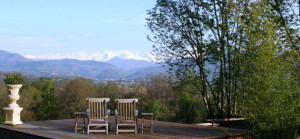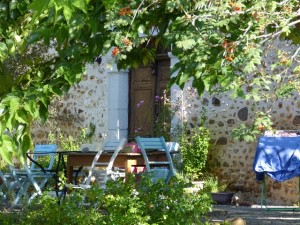Often when I tell people that we live in the foothills of the Pyrenees, they tend to assume that we are snowbound for much of the winter. Generally they are amazed to discover that, despite the fact that our village is less than 50 kilometres from the nearest ski resort, we actually get snow only a few days a year (if that) and often winter temperatures here are much higher than those in the UK.
Winter nights and early mornings are cold and we wouldn’t be without our wood burner but we are a long way south here so the sun has real warmth in it. Winter afternoons in the sun can often reach 17 or 18 degrees and we regularly sit outside to drink our coffee or enjoy lunch in the sun in February – a phenomenon I don’t ever remember experiencing in England. Cold and snow may be causing havoc in the UK right now but here in the lee of the mountains, we are enjoying the protective Foehn effect which means warm air and sunny days.
What’s more, rainy winter days aren’t miserable and vaguely depressing when you live in the foothills of the mountains because we know that, while it may be raining on us, fresh snow will be falling up in the mountains with all the promise of a fabulous day skiing, sledging or snowshoeing in the sun in the days to follow.
For me this is a perfect winter location; we have sunshine and warmth on a daily basis with chilly nights providing the perfect excuse to snuggle in front of the fire with a hot chocolate. Meanwhile, on the horizon, there is snow sparkling on the mountains with sledging, skiing and fabulous snowy walks whenever we want. The foothills of the Pyrenees truly are a winter wonderland.



![3[22]](https://foothillsoffrance.com/wp-content/uploads/2015/11/322-300x200.jpg)





You must be logged in to post a comment.